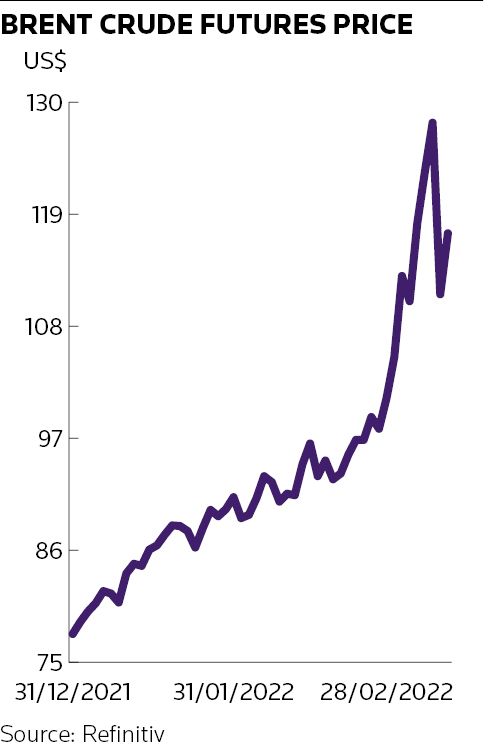Goldman Sachs is on track to make around US$1bn in commodities trading this quarter following dramatic swings in these markets, according to sources familiar with the matter, in what would be its best three-month period in commodities markets in over a decade.
The US bank had already generated roughly US$500m in commodities revenues before Russia’s invasion of Ukraine in February amid a notable rise in client activity, the sources said, and its traders have continued to perform well since then.
JP Morgan and Morgan Stanley are also set to report strong commodities results, sources said, as corporate treasurers and institutional investors have scrambled to position themselves for spiralling price increases. The war in Ukraine has only served to convulse these markets even further, prompting sharp moves in raw materials such as crude oil, natural gas, gold, nickel and wheat.
That high level of volatility means there is still some uncertainty around the quarter-end revenue numbers, the sources cautioned. Spokespeople for Goldman Sachs, JP Morgan and Morgan Stanley declined to comment.
The increase in commodities activity should help lift banks’ overall trading revenues in what has been the most volatile period for financial markets since the start of the coronavirus pandemic. Analytics firm Coalition Greenwich projects the top 12 investment banks will report a 7% decline in global markets revenues in the first quarter from a year ago, though that would still represent a more than a 35% increase from the first quarter of 2019 (the equivalent pre-pandemic quarter).
“This is a significantly healthier markets environment for banks than before the pandemic,” said Michael Turner, head of competitor analytics at Coalition Greenwich. “Although there might be some losses, the increased volatility means those will be offset by gains in other products. The largest banks with a broad offering should enjoy a portfolio effect.”
"We're expecting [an] uptick on the G-10 macro side, with banks doing very well in commodities, and downticks in equities and credit,” he added.
US banks’ commodity trading desks have grown in prominence since the start of the pandemic amid heightened volatility in energy and metals markets in particular. Goldman's senior management have highlighted strong performance in commodities trading on seven of the last eight quarterly earnings calls as the bank has leveraged its sprawling presence across these markets.
Oil strength
Commodities trading head Ed Emerson has overseen a broad-based rise in revenues this year across the commodities markets where Goldman is active, sources said.
Oil trading has continued to perform well under Xiao Qin and Anthony Dewell, whose teams also registered large gains in 2020 when oil futures prices plunged into negative territory. Brent crude oil futures contracts hit an intraday high of almost US$140 a barrel on March 7 – their most elevated level since 2008.
Power and gas, which Nitin Jindal heads in North America, and metals trading have also been strong for the bank, sources said. Prices of various precious and base metals have whipsawed in recent months, with gold briefly rising above US$2,000 an ounce. Elsewhere, the London Metal Exchange chose to halt nickel trading and cancel transactions after prices more than doubled on Tuesday to over US$100,000 a tonne.
Hedging interest
Bankers and consultants say a wider range of companies had been looking to insulate themselves against commodity price moves even before Russia's invasion of Ukraine, given the sustained increase in costs to raw materials that they were already facing.
"I’ve never spoken to so many companies about commodity hedging – even before the conflict in Ukraine started," said Amol Dhargalkar, global head of corporates at consultancy Chatham Financial. "Interest in hedging tends to be highly correlated with the commodity price cycle. As prices move upwards – whether it’s in metals or energy or agricultural products – companies have been scrambling to understand exposures across their organisations and supply chains, and have been looking to have a playbook to put into place."
Uncertain times
Executives note that despite the encouraging outlook for bank trading revenues more broadly, there remains considerable uncertainty over the exact numbers. Troy Rohrbaugh, JP Morgan’s head of global markets, told an investor conference on Tuesday the bank was still on track for a 10% decline in trading revenues from a year before, but noted that a lot of clients are under "extreme stress" and "that creates potentially very significant counterparty risk exposure".
Up until late February and the Ukraine conflict, senior bankers had reported a strong trading environment for products linked to interest rates and foreign exchange in particular, as investors reshuffled exposures in anticipation of the US Federal Reserve moving to quell inflation.
That contrasts with what looks set to be a more disappointing quarter for dealmaking. Turner at Coalition Greenwich said investment banks' dealmaking revenues could fall more than 40% from a year ago in the first quarter, mainly as a result of a sharp drop in ECM activity and SPAC listings in particular.
"What's really going to hurt on the investment banking side is the lack of SPACs," said Turner.
